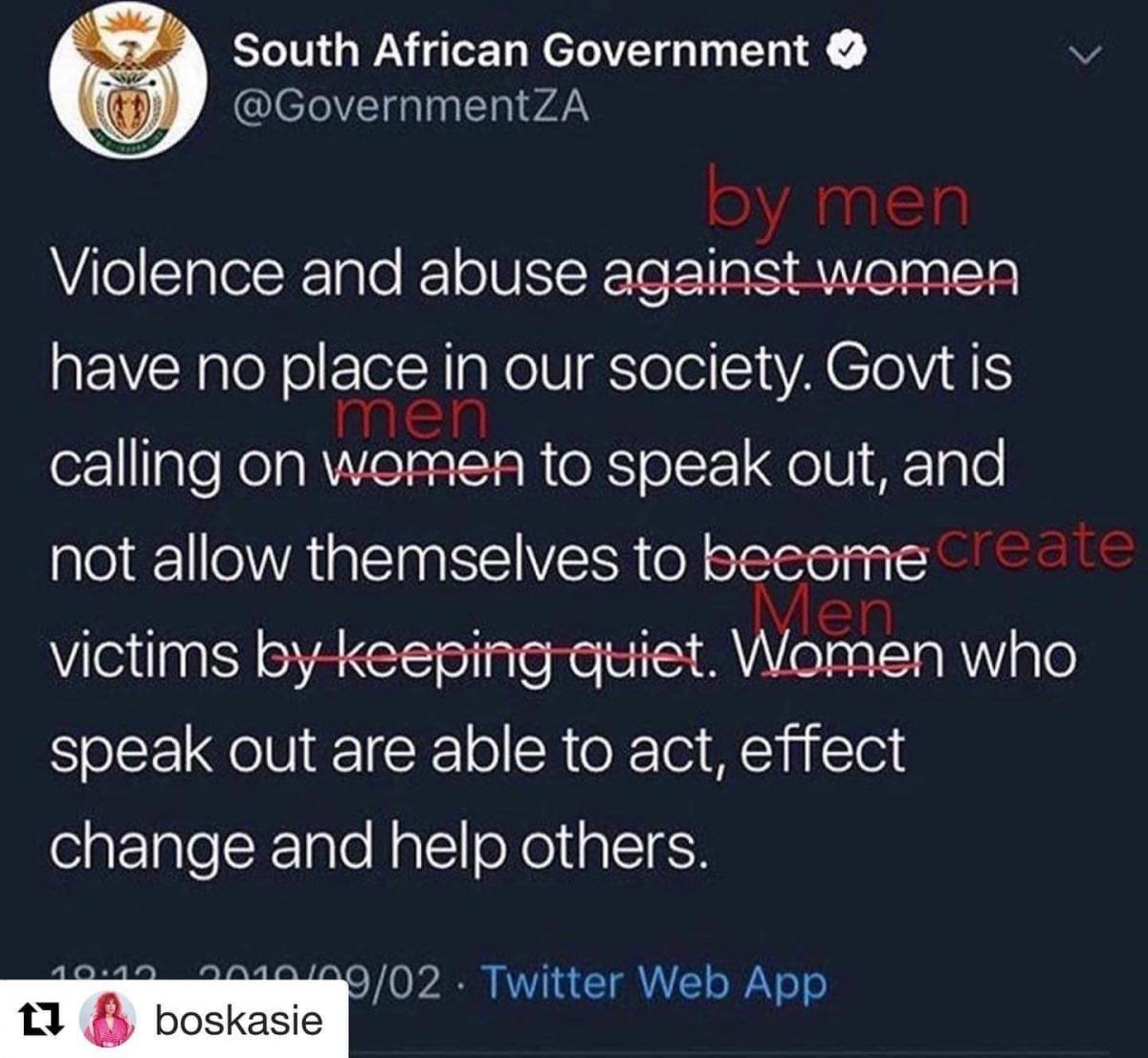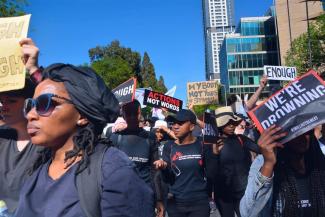Almost two months ago, South Africa made global headlines for seemingly unrelated instances of violence. Brutal attacks on African immigrants that left 12 dead and the rape and killing of a young university student, Uyinene Mrwetyana, while collecting a parcel at the post office. These horrific crimes revealed the dangerous blend of deepening inequality, xenophobia manipulated for political ends, and misogyny at the roots of a simmering political and economic crisis.
Overnight, thousands of women took to the streets with the rallying cry, #AmINext, to demand an end to the violence against all women and LGBTQI people. At the same time, many people denounced the violence against immigrants, particularly the South African government’s failure to recognise this violence as xenophobia. Citizens, businesses, and governments in Nigeria, Zambia, and Tanzania, among others, reacted. Taking an economic stand, Nigerian popstars boycotted planned shows, while the government pulled its ambassador to South Africa from the World Economic Forum.
In response, the South African government recited a familiar script. Total denial, displaced blame, condemnation after public pressure, and new action plans that many consider to be “mere lip service.” Mobilisations and organised responses were disparate as activists and civic leaders diagnosed these events as disconnected issues instead of seeing them as a violence continuum. The systemic nature of this violence is systemically denied and made invisible.
This violence is not new. What we are battling is an implosion of intertwined forms of violence all at once. These are not only testing our responses as movements and activists; they are also exposing our weaknesses in comprehending their magnitude in our society. This implosion of violence is deeply rooted in South Africa’s history and demands we shift our organising efforts and rebuild international solidarity. We need to start consciousness raising at the community level and reclaim the ideals of Pan-Africanism.
the community level and reclaim the ideals of Pan-Africanism.
On gender-based violence
Shocking levels of gender-based violence (GBV) have a long history in South Africa. People considered “other” – women, migrants, LGBTQI people – are persistent targets of violence. Uyinene joins the growing list of women, trans, lesbian, and gay people, children, the elderly and disabled people who have been attacked and killed over the last five years. Both public and private places are especially unsafe for women and LGBTQI people. The problem is so endemic as to merit the label of femicide. Increasingly, we are counting dead bodies, often found dumped, while many remain missing and presumed dead.
In a statement following public uproar over GBV, the government called on women to “speak out and not allow themselves to become victims by keeping silent.” Yet again, the government fails to comprehend the problem and shifts the blame from the perpetrator to the woman. Simultaneously, the government absolves its responsibility and role in protecting and promoting the wellbeing and safety of everyone living within South Africa. All this only exacerbates the burden that women and LGBTQ people carry. Now they must take care of their safety as though the violence they face is an individual problem and must simply “speak out” when they are attacked.
In a new action plan, the government made seven pledges to reform the justice system by increasing the number of courts tackling sexual offenses by creating a public sex offender list, and handing out harsher sentences to perpetrators, among others. While these responses can help combat GBV, they are only scratching the surface. Relying solely on developing (new) plans and frameworks is not enough. South Africa’s constitution protects the rights of LGBTQI people, but these rights do not protect them from institutionalised and everyday forms of social exclusion and discrimination. To address GBV, we need to understand the patriarchy and misogyny that fuels it, and the power dynamics that reinforce women and LGBTQI people’s “Othering.” At the heart of patriarchy are cultural misbeliefs about how women should dress and behave. Stepping out of these expected roles often results in violence meant to keep women in line. For example, men justify rape on LGBTQI people as a way to “correct” their gender identity and sexual orientation. Reporting rates are low due to mistrust in the justice system, and family members tend to be the biggest perpetrators of violence. We need to understand violence as a structural problem that starts and is bred in our very homes and reinforced by social and media narratives that depict women as the property of men. We also need to finance the implementation of existing programs. For instance, many safe houses for domestic violence survivors have either closed or struggle to stay open due to lack of funding.
On Xenophobia
Historically, the government has dismissed xenophobia as a problem of a few criminals. Some politicians like the recently resigned Johannesburg Mayor, Herman Mashaba, use high crime rates to justify crackdowns on non-South African business owners. “Criminality” is a limited understanding that ignores many contributing factors at play. In 2018, the World Bank named South Africa the most unequal country in the world. The legacies of apartheid, coupled with global economic trends, are increasing inequality and unemployment, and black communities are most impacted.
The recent trends of rising authoritarianism and anti-immigrant politics that pervade the U.S. and Europe are also present in South Africa. Similar to the U.S. Immigration and Customs Enforcement (ICE), the South African Police Service (SAPS) conducts regular sweeps for undocumented immigrants who are captured and held at the Lindela Repatriation Centre, one of South Africa’s largest detention centres. Like many deportation centres, the conditions are appalling. However, University of Witwatersrand Professor, Loren B. Landau cautions this resonance, “…Where Donald Trump, Matteo Salvini and Marine Le Pen stroke anti-immigrant sentiments from elevated national platforms, South Africa’s politicians have learned scapegoating from the streets.” He warns that anti-xenophobia campaigns that focus on “foreignness” as the issue run the risk of “…draw[ing] attention away from the reality that most violence and fraught displays of xenophobia are often rooted in local – municipal, township or even neighbourhood – battles for land, jobs, and political office.“
In an article for “The Conversation“, post-doctoral fellow at Witwatersrand University, Cuthbeth Tagwirei, pushes us to find a new narrative altogether: “The narrative needs to change from criminality or xenophobia or Afrophobia to the everyday, structural conditions which make socio-cultural differences amenable to easy exploitation by those who wield power.”
Weaving the threads together
Regardless of the reasons behind GBV and xenophobia, there are common trends we cannot ignore. We need to understand the legacies of apartheid and colonialism and how they created a deep sense of violence that people carry with them over generations. The violence we survived remains ingrained in institutions and equally in our psyches, affecting our ability to heal, manage, and cope with the contemporary challenges we face.
The hatred of people considered “Other” – women, migrants, and LGBTQI people – is deeply rooted, prevalent, and escalating. Some in power, political opportunists and religious conservatives, are using misinformation and built-in prejudices and discrimination around gender, race, class, and sexuality to divide communities. This careful strategy serves a few and masks the underlying problems we face and the forces behind them.
Everyone has a role to play
We need to reclaim and rebuild international solidarity. Never has it been more urgent that we bring back the ideals around Pan-Africanism. What does it mean to be “African” from a Pan-African perspective? If we cannot relate to other people and other Africans humanely, we will never be able to fight the ills in our society or the forces of injustice that we are up against. We cannot make solidarity a kumbaya song. We must give content to what real solidarity means. Even in upholding the sovereignty of each country, we cannot throw a blind eye to human rights abuses.
South Africa plays “big brother” on the African continent and yet, defends Zimbabwe’s abusive government. That is not to say we must interfere with a country’s sovereignty and self-determination. Instead, in the spirit of Pan-Africanism, we have to think deeply about how these crises impact black people across the continent and hold collective responsibility for solving them.
Everyone has a role to play in transforming our future. We need to develop organising initiatives that are not just responsive to crisis moments, but that form part a long-term movement logic of organising. We need to start at the community level because this is where we need to be to reach the level of consciousness that genuinely appeals to hearts and minds. We are not going to solve the problem by starting an opposition party or organising outside of the community. No space should go unattended. We should go and hold conversations in places where people congregate formally and informally – from taverns to corner shops.
JASS’ work is rooted in strengthening community-based organisations of women, feminists, and LGBTQI people and the idea that cross-movement and cross-border dialogues and organising are necessary strategies of this moment. JASS is committed to challenging the power that fuels violence and working with everyone who shares our ideals. This is feminist movement building – a critical contribution to building a just and equal society that works for us all.


























